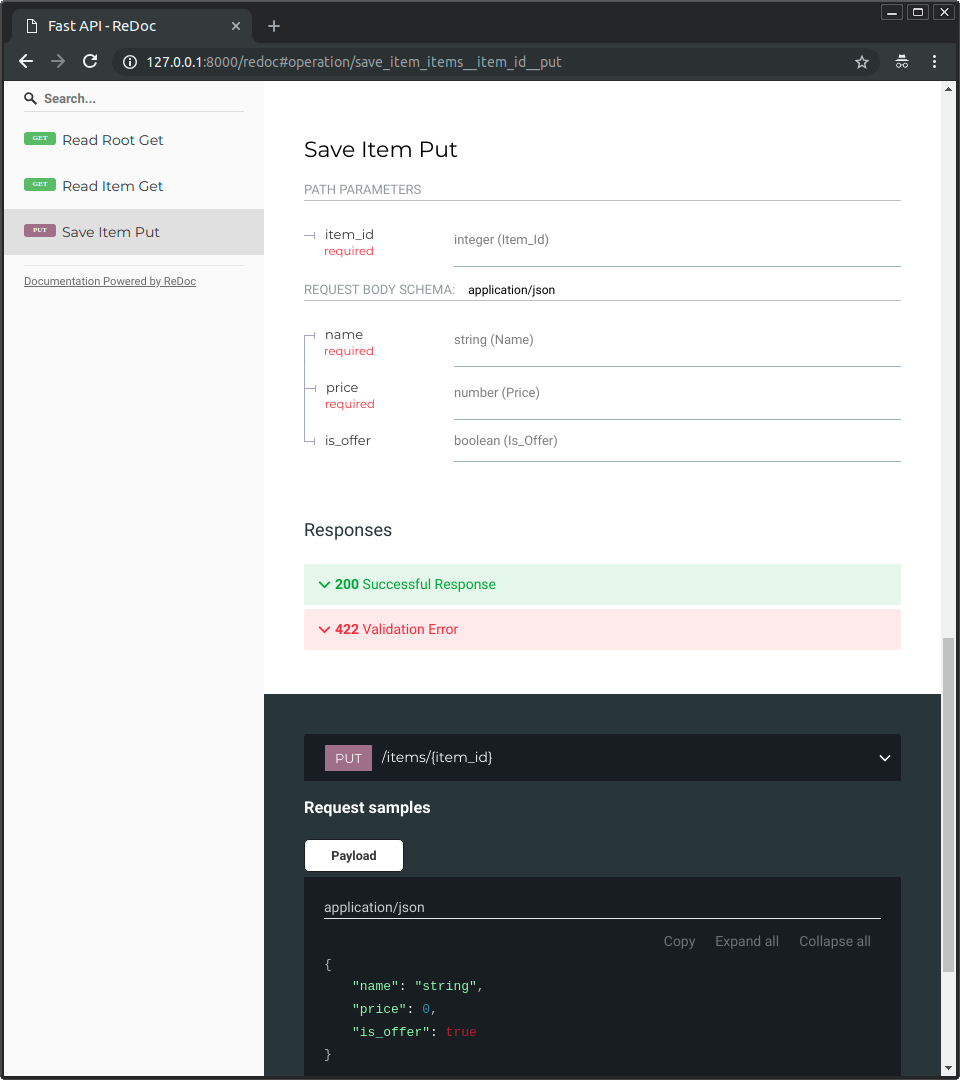- Sort Score
- Result 10 results
- Languages All
Results 1 - 10 of 103 for You (0.14 sec)
-
docs/en/docs/tutorial/handling-errors.md
Let's say you have a custom exception `UnicornException` that you (or a library you use) might `raise`. And you want to handle this exception globally with FastAPI. You could add a custom exception handler with `@app.exception_handler()`: ```Python hl_lines="5-7 13-18 24" {!../../../docs_src/handling_errors/tutorial003.py!} ```
Plain Text - Registered: Sun Apr 28 07:19:10 GMT 2024 - Last Modified: Fri Mar 22 01:42:11 GMT 2024 - 9.1K bytes - Viewed (0) -
docs/en/docs/tutorial/dependencies/dependencies-with-yield.md
## Dependencies with `yield` and `HTTPException` You saw that you can use dependencies with `yield` and have `try` blocks that catch exceptions. The same way, you could raise an `HTTPException` or similar in the exit code, after the `yield`. !!! tip
Plain Text - Registered: Sun Apr 28 07:19:10 GMT 2024 - Last Modified: Sat Feb 24 23:06:37 GMT 2024 - 14.1K bytes - Viewed (0) -
docs/en/docs/advanced/events.md
## Use Case Let's start with an example **use case** and then see how to solve it with this. Let's imagine that you have some **machine learning models** that you want to use to handle requests. 🤖
Plain Text - Registered: Sun Apr 28 07:19:10 GMT 2024 - Last Modified: Thu Apr 18 19:53:19 GMT 2024 - 7.8K bytes - Viewed (0) -
docs/en/docs/advanced/settings.md
Next it will convert and validate the data. So, when you use that `settings` object, you will have data of the types you declared (e.g. `items_per_user` will be an `int`). ### Use the `settings` Then you can use the new `settings` object in your application: ```Python hl_lines="18-20" {!../../../docs_src/settings/tutorial001.py!} ``` ### Run the server
Plain Text - Registered: Sun Apr 28 07:19:10 GMT 2024 - Last Modified: Thu Apr 18 19:53:19 GMT 2024 - 15.7K bytes - Viewed (0) -
docs/en/docs/how-to/configure-swagger-ui.md
SwaggerUIBundle.SwaggerUIStandalonePreset ] ``` These are **JavaScript** objects, not strings, so you can't pass them from Python code directly.
Plain Text - Registered: Sun Apr 28 07:19:10 GMT 2024 - Last Modified: Thu Apr 18 19:53:19 GMT 2024 - 2.8K bytes - Viewed (0) -
docs/en/docs/advanced/wsgi.md
# Including WSGI - Flask, Django, others You can mount WSGI applications as you saw with [Sub Applications - Mounts](sub-applications.md){.internal-link target=_blank}, [Behind a Proxy](behind-a-proxy.md){.internal-link target=_blank}. For that, you can use the `WSGIMiddleware` and use it to wrap your WSGI application, for example, Flask, Django, etc. ## Using `WSGIMiddleware` You need to import `WSGIMiddleware`.
Plain Text - Registered: Sun Apr 28 07:19:10 GMT 2024 - Last Modified: Thu Apr 18 19:53:19 GMT 2024 - 1.1K bytes - Viewed (0) -
docs/en/docs/tutorial/sql-databases.md
**FastAPI** doesn't require you to use a SQL (relational) database. But you can use any relational database that you want. Here we'll see an example using <a href="https://www.sqlalchemy.org/" class="external-link" target="_blank">SQLAlchemy</a>. You can easily adapt it to any database supported by SQLAlchemy, like: * PostgreSQL * MySQL * SQLite
Plain Text - Registered: Sun Apr 28 07:19:10 GMT 2024 - Last Modified: Thu Apr 18 19:53:19 GMT 2024 - 29.6K bytes - Viewed (0) -
docs/en/docs/tutorial/dependencies/classes-as-dependencies.md
## Classes as dependencies You might notice that to create an instance of a Python class, you use that same syntax. For example: ```Python class Cat: def __init__(self, name: str): self.name = name fluffy = Cat(name="Mr Fluffy") ``` In this case, `fluffy` is an instance of the class `Cat`. And to create `fluffy`, you are "calling" `Cat`.Plain Text - Registered: Sun Apr 28 07:19:10 GMT 2024 - Last Modified: Thu Apr 18 19:53:19 GMT 2024 - 11.4K bytes - Viewed (0) -
docs/en/docs/reference/response.md
# `Response` class You can declare a parameter in a *path operation function* or dependency to be of type `Response` and then you can set data for the response like headers or cookies. You can also use it directly to create an instance of it and return it from your *path operations*. You can import it directly from `fastapi`: ```python from fastapi import Response ```
Plain Text - Registered: Sun Apr 28 07:19:10 GMT 2024 - Last Modified: Thu Apr 18 19:53:19 GMT 2024 - 397 bytes - Viewed (0) -
docs/en/docs/index.md
 ### Recap In summary, you declare **once** the types of parameters, body, etc. as function parameters. You do that with standard modern Python types. You don't have to learn a new syntax, the methods or classes of a specific library, etc. Just standard **Python 3.8+**. For example, for an `int`:
Plain Text - Registered: Sun Apr 28 07:19:10 GMT 2024 - Last Modified: Thu Apr 18 23:58:47 GMT 2024 - 19.2K bytes - Viewed (0)